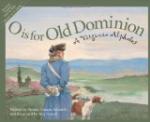We trudged about within the old town limits and tried to picture the chief events of those years; but we could not remember what they were; so we sat down on the grassy fort, regardless of ticks and redbugs, to read up some more. For a while there was no sound but the twitter of the birds and the murmur of the river. Then the Commodore found something in his book, and he began very solemnly to tell of how on that very spot the colonists endured the horrors of the “Starving Time.” At this there was such a genuine exclamation of pleasure from Nautica that the Commodore knew he was too late; she had not even heard. She had found something in her book too, and was already announcing that it was right there that John Rolfe and Pocahontas were married.
But the Commodore insisted that his story came first, as Nautica’s romantic event was not until 1614, while his famine was in 1609-10. Nautica sighed resignedly as she agreed that we should starve first and get married afterward.
After all, we found that we could not speak lightly, sitting there in the midst of the scene of the “Starving Time.” By the winter of 1609-10 there were perhaps five hundred persons in this little settlement by the river, including now, unfortunately, some women and children. When there was no more corn, the people managed for a while to keep alive on roots and herbs; then, half-crazed by starvation, they fell to cannibalism. Gaunt, desperate, de-humanized, they crouched about the kettle that held their own dead. A Bible fed the flames, cast in by a poor wretch as he cried, “Alas! there is no God!”
The succeeding spring brought two ships, a belated portion of one of the “Supplies.” But sixty of the five hundred colonists were found alive—sixty haggard men, women, and children, hunger-crazed, huddled behind the broken palisades. Sadly suggestive must have seemed the names of the two vessels that appeared upon that awful scene—Patience and Deliverance. But the deliverance that they brought was of a poor sort. They had not on board provisions enough to last a month.
It was decided that it was vain for the colony to try to hold out longer. James Towne, upon which so much blood and treasure had been spent and that had seemed at last to give England a hold in the New World, must be abandoned. To the roll of drums, the remnant of the colony boarded the vessels, sails were set, and the little ships dropped down the river bound for far-away England.
The last sail passed around the bend in the stream, and only a desolate blotch in the wilderness was left to tell of England’s attempt to colonize America; only a great gash in the forest, there in the quiet and the sunlight, at the edge of the river. Within it were the shapeless ruins of those queer things the pale-faces had made—broken palisades, yawning houses, the tottering thing they called a church; and, all about, the hideous, ghastly traces of living and of dying. The sun went down; and, in the gloom of the summer night, from the forest and the marsh wild things came creeping to the edge of the clearing, sat peering there, then ventured nearer—curious, suspicious, greedy. Soft, noiseless, and ghost-like was the flight of the great owl through the desolation, and his uncanny cry and the wail of the whippoorwill filled the night as with mockery and mourning.




